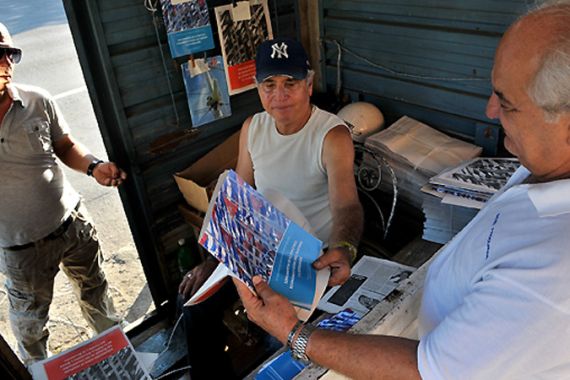Cuba releases plan for economic reforms
Among other changes, the new guidelines will allow Cubans to travel abroad as tourists for the first time in 50 years.

 |
| Since 2008, Raul Castro has championed a limited but significant shift to the free market [EPA] |
Cubans will be allowed to travel abroad as tourists for the first time in more than 50 years, Raul Castro’s government has announced.
The government’s new economic guidelines, released on Monday, gave no further details on the travel policy or a date at which it would be implemented, but the move was seen as an official decision to authorise foreign travel as part of a series of landmark reforms.
Though travel abroad is not banned outright, there is a de facto ban; Cubans who want to leave the Caribbean island face numerous bureaucratic obstacles, including receiving an invitation letter from abroad.
Then a $150 fee is required for an exit request, which may be denied.
Travel abroad has been limited to 30 days, and the paperwork authorising foreign travel amounts to around $400 – unthinkable for most Cubans, who earn about $20 a month.
Policy shift
The policy shift is part of a series of reforms announced by Raul Castro, the country’s president, to give a jolt to Cuba’s crippled economy, ostensibly by introducing elements of private enterprise without abandoning socialist principles.
The economic overhaul was approved unanimously last month at a landmark Communist Party Congress, but the final document was not released until Monday.
In other significant changes, Cubans will be allowed to buy and sell automobiles or homes, and bank loans are to become more readily available.
The 313-point guidelines say the state ought to “establish the buying and selling of homes” for Cuban citizens. There is no mention of how the system will work, what restrictions will be imposed or what taxes might be levied – all crucial to judging the scope of the changes.
The framework also says Cubans should be encouraged to form co-operatives that could function as mid-size companies with many employees. The new guidelines allow such employee-owned businesses to directly sell products to consumers or business owners, without the state operating as an intermediary.
The guidelines also say the state will convert many public buildings into residential properties in an effort to ease severe housing shortages.
Shift to the free market
Since taking over from brother Fidel Castro in 2008, Raul Castro has championed a limited but significant shift to the free market. Last year, he announced that Cubans would be allowed to go into business for themselves in 178 approved enterprises, hire employees and rent out cars and homes.
Castro has also pledged to cut up to 500,000 state jobs and has warned his countrymen that the government can no longer afford the deep subsidies it gives workers.
The guidelines say cuts in the subsidies will continue so that eventually only those with the most need – such as children, the sick and the elderly – will receive benefits.
Currently, all Cubans receive a basic basket of goods through monthly ration books, as well as free education and healthcare, and nearly free housing, utilities and transportation.
The changes aim “to compensate needy people and not subsidise products in general,” the guidelines say.
Other guidelines make clear the government’s desire to eliminate Cuba’s unusual dual currency system, legalise the sale of construction material at unsubsidised prices, promote the fishing industry and link sugar prices paid to Cuban producers with prices paid on international markets.